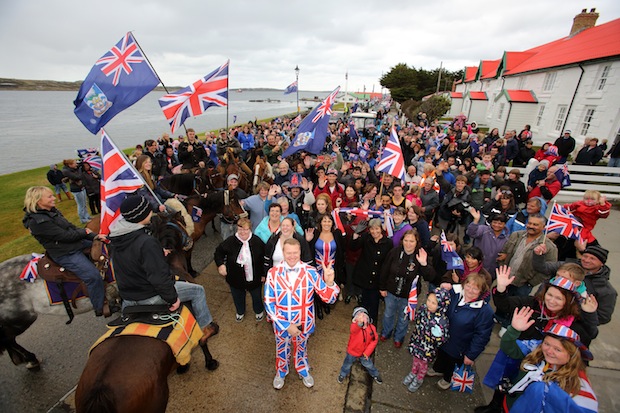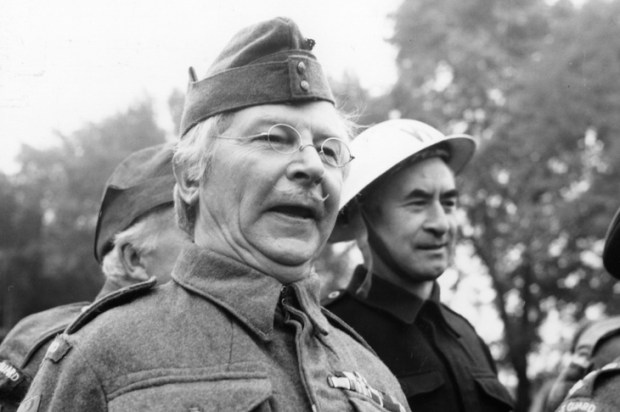I went to the Falkland Islands last month. The territory is at something of a turning-point in its history. There are reserves of oil in its waters, and both British and American firms are there seeking the means to extract them economically. If they succeed, these windswept islands could end up being the richest place per capita on the planet, with a sovereign wealth fund, and occasioning even more jealousy than usual from Argentina, which still claims sovereignty of them.
On my trip I encountered a predictable level of antipathy towards Argentina, but a surprising level of affection towards Great Britain, and towards the idea of the Commonwealth. This is not just for the simple reason that the Falklanders remember who liberated them in 1982, and at what cost — 255 British lives — but for a more profound reason. Looking across the water to Argentina, the islanders see a country where democracy has a tenuous hold, where diplomacy is a joke, where economic figures are fiddled and fabricated to an extent where they are formally ignored by much of the rest of the world and where discontent seethes below the surface. What they like about Britain and the Anglo-Saxon world are its values, not least of self-determination, democracy and probity in government. And they consciously identify those values as being at the core of the way of life they seek to preserve by keeping Argentina away from the islands.
I must admit to being something of a Commonwealth sceptic. The way Britain largely abandoned the organisation of its former colonies and dominions when it joined Europe in 1973 was, to many of us, utterly shameful. Blood is thicker than water, however, and when one experiences the importance of democratic values — as one does when talking to a Commonwealth people who live under threat of invasion and within earshot of sabre-rattling — it is rather humbling.
The British government these days certainly does take the Commonwealth seriously. This may be partly an effect of the mounting disillusion with Europe, but it is also because of a new recognition that the ties of shared history binding the Commonwealth count for something significant in an increasingly unstable world. This is also true in Australia, a country infinitely larger and more populous than the Falklands, but built on the same values and a common pioneer spirit. A recent poll showed that support for the idea of a republic in Australia has fallen by 15 per cent since the referendum of 1999, suggesting that the Anglo-Saxon notion of a constitutional monarch and a non-political head of state continues to hold great attraction even in the 21st century.
But before one gets carried away on a tide of nostalgic affection for the idea of the Commonwealth, one should pause to consider the fragility of the institution itself. Word is that behind the scenes at the last Heads of Government Meeting in Sri Lanka in the autumn of 2013 there were some fraught discussions based not on cultural misunderstandings but on sheer cultural differences between some of the players. One is loath to talk about a ‘white Commonwealth’, but there does seem, with certain important exceptions, to be a measure of polarisation between those countries that were settled by British emigrants and those that were conquered and colonised by them.
Zimbabwe was suspended from the club for serial human rights violations under the Mugabe regime in 2002; and it chose to leave the organisation altogether in 2003, determined not to accept the view that other nations had of it. Since then certain other black African countries have lobbied relentlessly to allow its readmission, despite the evidence that nothing much has changed in Zimbabwe, and will not do so until Mugabe (who has just celebrated his 90th birthday) has gone to the final reckoning.
One of those interceding on Mugabe’s behalf is Jacob Zuma, whose own conduct of office in South Africa increasingly leaves much to be desired: Nelson Mandela he is not. South Africa is seen as increasingly corrupt, cronyist, dangerous and authoritarian, and it sits increasingly uncomfortably within a Commonwealth template of advancing democracy, civilisation and political integrity.
It would be fatal for the Commonwealth to become polarised between ‘white’ and ‘black’ countries, not least because some nations whose rulers are not of Anglo-Saxon descent behave perfectly reasonably and honourably. Yet there is a growing challenge as some nations within the family behave in a fashion unacceptable in polities such as Australia, Britain, Canada or New Zealand. At the end of February Yoweri Museveni, the president of Uganda, signed into law a Bill making homosexuality (which was already illegal) and same-sex marriages crimes punishable by life sentences, and the promotion of homosexuality a crime carrying a still heavy sentence of seven years. Hitherto such sanctions as existed applied only to men: now lesbians will feel the force of the law too. After the furore surrounding President Putin’s homophobic policies in the context of the Sochi Winter Olympics, it will be hard for the Commonwealth to turn a blind eye to Uganda locking up people for life because they are homosexual; we must wait and see.
In an ideal world, an institution such as the Commonwealth would lead all its members along the path to enlightenment. The most significant country in this respect is India, which has become progressively more westernised as it has put its considerable economic and human capital to work on becoming one of the great business success stories of the 21st centuries. Without considerable leadership from the non-white Commonwealth, extending the values of Australians, Britons and Falklanders into parts where they hitherto have not reached may be problematic at best, and impossible at worst. Had South Africa produced another Mandela, he — or she — would have had this leadership role, because (other than Pakistan, which has nightmares all of its own) the part of the Commonwealth where those values are most under threat is the collection of Britain’s former colonies and possessions in Africa. It used to be called the white man’s burden; but in the interests of good government, liberty, prosperity and decent human rights it can no longer be his alone.
The great challenge of the Commonwealth now, if its continued existence is to have a point, is to make those values an abiding concern to those who do not trace their ancestry back to a windswept island in the north Atlantic, or who live on smaller, even more windswept ones in the south.
Got something to add? Join the discussion and comment below.
Get 10 issues for just $10
Subscribe to The Spectator Australia today for the next 10 magazine issues, plus full online access, for just $10.
Simon Heffer is the author of High Minds: The Victorians and the Birth of Modern Britain (Random House).
You might disagree with half of it, but you’ll enjoy reading all of it. Try your first month for free, then just $2 a week for the remainder of your first year.














Comments
Don't miss out
Join the conversation with other Spectator Australia readers. Subscribe to leave a comment.
SUBSCRIBEAlready a subscriber? Log in